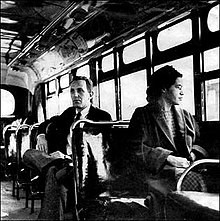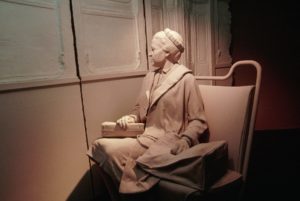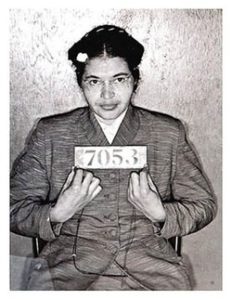 Rosa Parks was a civil rights activist who refused to surrender her seat to a white passenger on a segregated bus in Montgomery, Alabama in 1955. Her defiance sparked the Montgomery Bus Boycott; its success launched nationwide efforts to end racial segregation of public facilities.
Rosa Parks was a civil rights activist who refused to surrender her seat to a white passenger on a segregated bus in Montgomery, Alabama in 1955. Her defiance sparked the Montgomery Bus Boycott; its success launched nationwide efforts to end racial segregation of public facilities.
Ohio and Oregon commemorate the occasion on the anniversary of the day she was arrested, December 1, while California and Missouri commemorate Rosa Parks Day on her birthday 4 February.
Parks’ childhood brought her early experiences with racial discrimination and activism for racial equality. In one experience, Parks’ grandfather stood in front of their house with a shotgun while Ku Klux Klan members marched down the street.
On December 1, 1955, Parks was arrested for refusing a bus driver’s instructions to give up her seat to a white passenger. She later recalled that her refusal wasn’t because she was physically tired, but that she was tired of giving in. After a long day’s work at a Montgomery department store, where she worked as a seamstress, Parks boarded the Cleveland Avenue bus for home. She took a seat in the first of several rows designated for “coloured” passengers.


The Montgomery City Code required that all public transportation be segregated and that bus drivers had the “powers of a police officer of the city while in actual charge of any bus for the purposes of carrying out the provisions” of the code. While operating a bus, drivers were required to provide separate but equal accommodations for white and black passengers by assigning seats.
This was accomplished with a line roughly in the middle of the bus separating white passengers in the front of the bus and African-American passengers in the back. When an African-American passenger boarded the bus, they had to get on at the front to pay their fare and then get off and
re-board the bus at the back door.
As the bus Parks was riding continued on its route, it began to fill with white passengers. Eventually, the bus was full and the driver noticed that several white passengers were standing in the aisle. The bus driver stopped the bus and moved the sign separating the two sections back one row, asking four black passengers to give up their seats.
The city’s bus ordinance didn’t specifically give drivers the authority to demand a passenger to give up a seat to anyone, regardless of colour. However, Montgomery bus drivers had adopted the custom of moving back the sign separating black and white passengers and, if necessary, asking black passengers give up their seats to white passengers. If the black passenger protested, the bus driver had the authority to refuse service and could call the police to have them removed.
Three of the other black passengers on the bus complied with the driver, but Parks refused and remained seated. The driver demanded, “Why don’t you stand up?” to which Parks replied, “I don’t think I should have to stand up.” The driver called the police and had her arrested.
Parks said, “When that white driver stepped back toward us, when he waved his hand and ordered us up and out of our seats, I felt a determination cover my body like a quilt on a winter night”.
Parks said she had decided, “I would have to know for once and for all what rights I had as a human being and a citizen”.
The police arrested Parks at the scene and charged her with violation of Chapter 6, Section 11, of the Montgomery City Code. She was taken to police headquarters, where, later that night, she was released on bail.


Members of the African-American community were asked to stay off city buses on Monday, December 5, 1955 – the day of Parks’ trial – in protest of her arrest. People were encouraged to stay home from work or school, take a cab or walk to work.
The Montgomery Bus Boycott, as it came to be known, was a huge success, lasting for 381 days and ending with a Supreme Court ruling declaring segregation on public transit systems to be unconstitutional.
When Parks arrived at the courthouse for trial on 5 December 1955 with her attorney, Fred Gray, she was greeted by a bustling crowd of around 500 local supporters, who rooted her on. Following a 30-minute hearing, Parks was found guilty of violating a local ordinance and was fined $10, as well as a $4 court fee.
Inarguably the biggest event of the day, however, was what Parks’ trial had triggered. The city’s buses were, by and large, empty. Some people carpooled and others rode in African-American-operated cabs, but most of the estimated 40,000 African-American commuters living in the city at the time had opted to walk to work that day – some as far as 20 miles.
Unable to find work, she and her husband Raymond eventually left Montgomery; the couple, along with Parks’ mother, moved to Detroit, Michigan. There, Parks made a new life for herself, working as a secretary and receptionist in U.S. Representative John Conyer’s congressional office. She also served on the board of the Planned Parenthood Federation of America.
In 1987, with longtime friend Elaine Eason Steele, Parks founded the Parks and Raymond Parks Institute for Self-Development. The organization runs “Pathways to Freedom” bus tours, introducing young people to important civil rights and Underground Railroad sites throughout the country.
Rosa was awarded the Martin Luther King Jr Award by the National Association for the Advancement of Colored People, the Presidential Medal of Freedom and the Congressional Gold Medal. The United States Congress has called her “the first lady of civil rights” and “the mother of the freedom movement”.


Join the discussion
0 people are already talking about this, why not let us know what you think?